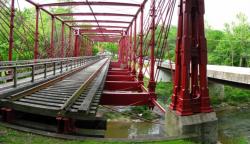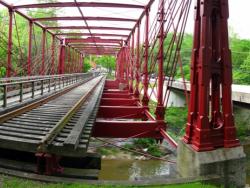The structure has two segments: an East Channel bridge consisting of four 175-foot spans and three 240-foot spans crossing from Harrisburg to City Island; and a West Channel bridge, consisting of seven 175-foot spans crossing from City Island to Wormleysburg.
With 15 truss spans totaling 2,820 feet, the Walnut Street Bridge is the finest and largest surviving example of the standardized Phoenix wrought-iron truss bridges produced from 1884 to 1923.






